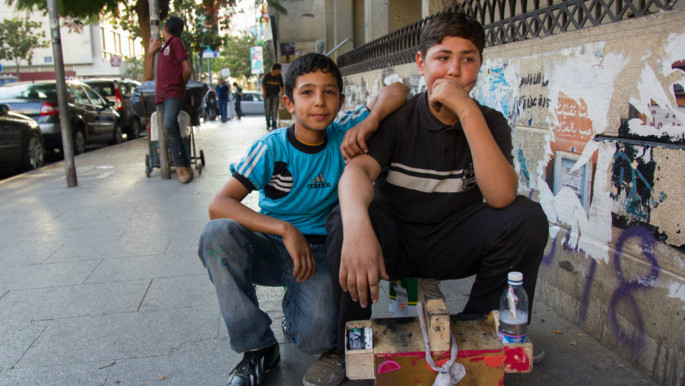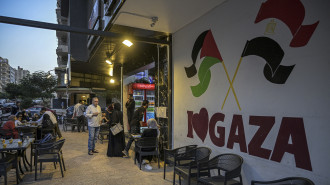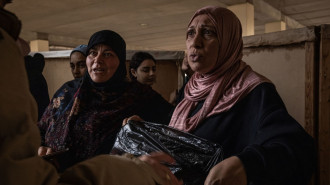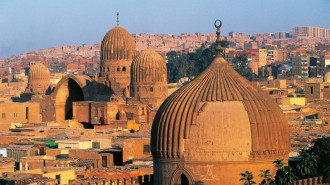Capharnaüm: Tackling child abuse in Lebanon through film
Capharnaüm means "a place with a disorderly accumulation of objects", and in the film this accumulation is applied to the characters facing a disorder of things in one place: Beirut.
Between present time and flashbacks, the movie follows the story of Zain, (played by Zain Al Rafeaa) a street-smart kid whose real age is unknown as he doesn't have identity papers. Tracking his life from his abusive family forcing him and his sisters to work, to life on the streets and then in prison.
The drama follows Zain's complaint against his parents in court, trialling them for just "being born".
The film tackles a number of issues, from child labour, to physical and emotional abuse, cruelty, early marriage, statelessness and even racism. They emerge in a tale that strikes by its strength, but mixed with tenderness and rawness.
Nadine Labaki – who plays Zain's lawyer in court – has been helping children against abusive situations through her support work as ambassador of local organisation Himaya.
 |
|
| Read also: The plight of Lebanon's working street children |
She says she was inspired by real situations she encountered with children she met. Her research began six years ago, through Himaya and other children protection organisations in Lebanon, where she would meet children who were victims of abuse in centres, shelters and on the field.
"The depiction of abuse made in Capharnaüm is very accurate," Sally Rizk, a social worker for Himaya told The New Arab. "While working with children who need help, we are confronted to these situations on daily basis."
The young social worker explained that Himaya has around 35 ongoing cases and around 20 new cases each month, from all nationalities. In 2017, the organisation faced 545 cases of neglect, 281 physical, 275 emotional and 135 sexual abuse, and 12 of exploitation, the majority regarding boys, with 714 boys for 534 girls.
Rizk recalled a case that particularly moved her: "A girl of almost three-years-old, her father was doing heroin and beating his wife in front of her. He even tried to give her heroin.
"Her mother's sister went to seek help at Kafa [a local women's rights organisation] and they sent her to Himaya. We worked with the mother and her daughter through the judiciary process and the father ended up in jail. We followed the daughter with psycho-social support, she was so scared for her father to come back. Her mother is strong and had financial resources, so they are both doing better now."
Organisations like Himaya provide psycho-social programmes and follow-up for families on the ground, sometimes going through judiciary action for heavy cases like sexual abuse, where the child needs to be withdrawn from the abusive family member. But a whole part of their work is at the awareness level, with prevention sessions led in schools, universities, other organisations, and with teachers, the army and the police first in line to prevent abuse from being repeated and alert the authorities.
A youth protection law does exist in Lebanon. Law 422 was adopted in 2002 and defines a unified protection system for any child/minor on the Lebanese territory, giving the judicial authority the power to interfere sua sponte whenever a child's interest is at risk.
It can be the case if a child is in an environment exposing him to exploitation, or adversely affecting the child's health, safety, morality, or upbringing; is exposed to sexual or violent corporal attack beyond the customary non-harmful disciplinary measures; or is found in a state of mendacity or vagrancy.
"I think the number of cases we see is a lot for Lebanon, especially since we have a law protecting children," Rizk adds. "We have also signed international agreements. But in the end, it's not always applied, so we really need to focus on awareness."
Himaya is launching a new project with the Ministry of Health on November 4 to standardise child abuse detection in all Lebanese hospitals.
|
|
||
| See the trailer for Capharnaüm here [YouTube] |
"Capharnaüm really did have an impact on people," Himaya's administrative director Kim Heshme told The New Arab.
"I even heard some people saying it was 'too much,' but it is reality for some people. After, I told [director] Nadine Labaki: 'Now, the work begins.' It shed light on the extent of the situation and brought awareness to a big audience, we have to keep working to make real change happen."
For Sazan Baban, interim child protection technical adviser for international organisation Save the Children, there was an increase over the past eight years due to "resources depleted within communities".
"The infrastructure is really stretched-out, the number of families below the poverty line is increasing leading people to develop negative coping mechanisms like frustration and stress," explains Baban.
"This equates to terrible situations for many children. They must support their family financially, they are unable to go to school and sometimes are even married off. It is important to work within these social structure to bring solutions that will help families and children recover and change behaviour. The government and many organisations are working to implement the law so we can see progress.
"I'm hopeful that things will change for the better," Baban tells The New Arab.
Florence Massena is a freelance journalist based in Lebanon, where she reports on the region with a focus on the environment, women's issues, refugees and humanitarian initiatives.
Follow her on Twitter: @FlorenceMassena

![Palestinians mourned the victims of an Israeli strike on Deir al-Balah [Getty]](/sites/default/files/styles/image_684x385/public/2024-11/GettyImages-2182362043.jpg?h=199d8c1f&itok=xSHZFbmc)


![The law could be enforced against teachers without prior notice [Getty]](/sites/default/files/styles/image_684x385/public/2178740715.jpeg?h=a5f2f23a&itok=hnqrCS4x)
 Follow the Middle East's top stories in English at The New Arab on Google News
Follow the Middle East's top stories in English at The New Arab on Google News


